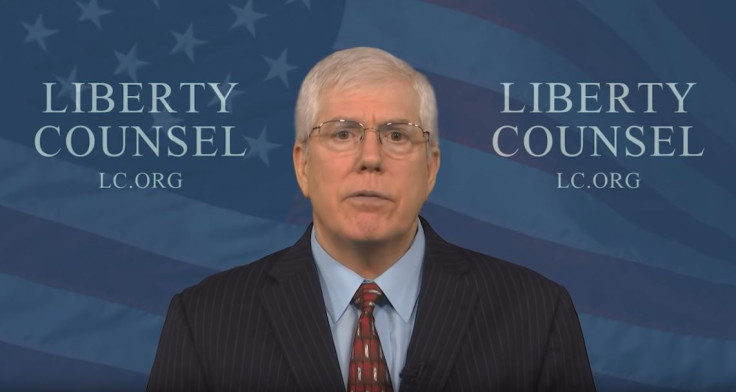Top evangelical lawyer wants gay judges banned from hearing cases about religious freedom
Mathew Staver is head of the Liberty Counsel, which defends Christians accused of anti-LGBT discrimination.

A leading evangelical legal chief has called for gay judges to be banned from hearing cases relating to issues of religious freedom. Mathew Staver is head of the Liberty Counsel, which has defended Christians accused of anti-LGBT discrimination.
Staver made his comments during a discussion about the nomination of the first openly gay chief justice of a state Supreme Court on VCY America's Crosstalk radio programme. The comments were picked up by Right Wing Watch.
"Here's the problem with it," he said.
"Beyond the issue of the morality of this, beyond the issue of other consequences is the fact that what we typically see is someone's identity, their being, completely wrapped up in their sexual practices.
"Do you think that if you had an Aaron and Melissa Klein or a Jack Phillips bakery or anything else like that where you have the LGBT clash with religious freedom or freedom of expression come before this judge, do you think this judge is going to be open and fair, irrespective of what he does, to rule based on the Constitution and the rule of law? I don't think so.
"That's why this is a real problem. What we are doing is we're putting somebody on a bench who is siding with their personal identity."
The Liberty Counsel opposed the decriminalisation of homosexual sodomy in 2003's Lawrence v. Texas case (which they ultimately lost) and represented Kentucky clerk Kim Davis, who refused to issue marriage licenses to same-sex couple in defiance of a Supreme Court ruling that such couples have the right to marry.
Staver also likened a gay judge hearing religious freedom cases to a judge convicted of sexual misconduct hearing a case about sexual assault.
"Imagine a case coming before him, and it's about sexual molestation of someone. Do you think you're going to get a fair shake out of that guy? I don't think so.
"So the question is: are you going to get a fair shake out of this individual, who identifies as someone based upon his sexual practices, who is identified and identifies himself based upon certain behaviour?
"Are you gonna get a fair shake? I don't think so. So that is a real problem in this nomination of this appointment of this individual."
His comments were in reference to Andrew McDonald, who was recently nominated to serve as a chief justice of the Connecticut Supreme Court. If confirmed, he would be the first openly gay person to serve in such a position.





















